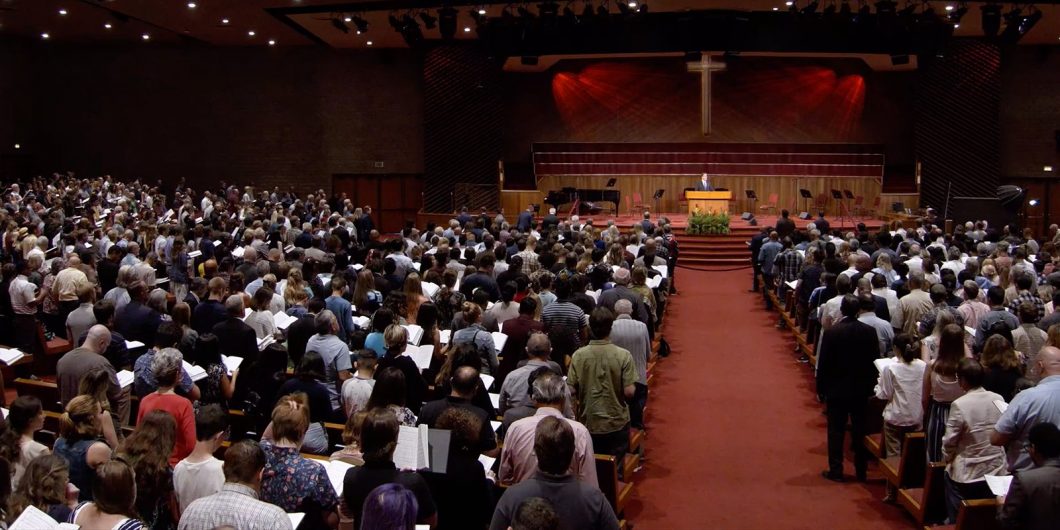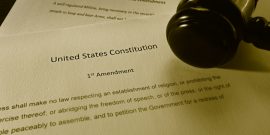What the decision in the Peace Cross case on religious symbolism portends is as yet unclear; but some interpretations would lead to perverse results.
Who Is Caesar to the Church?
This summer, Grace Community Church (GCC) in California, a megachurch pastored by John McArthur, a highly influential leader in American Evangelicalism, issued a statement, Christ, Not Caesar, is Head of the Church: A Biblical Case for the Duty of the Church to Remain Open. A few weeks later, Bradford Littlejohn, president of the Davenant Institute, a collection of scholars committed to classical Protestantism, posted a widely linked 7,400 word response in which he argued the statement by GCC represented “unsound reasoning” and concluded that McArthur is “a confused shepherd, leading countless sheep straight into the line of fire.” At bottom, Littlejohn argues, GCC lacks the expertise to second guess the civil government’s closure policies. While GCC’s statement does paint too boldly in black and white, Littlejohn’s criticism of the statement would seem to have churches defer too reflexively to civil authority, effectively ceding decisions over the spiritual welfare of their congregations to civil government.
The debate between GCC and Littlejohn takes place at a high level, at least for modern American Christians. Both agree on a pivotal, though widely unknown, theological claim, that the church’s self-identity is that it has authority as a government, an ecclesiastical government, to be sure, but a government nonetheless.
In this view, the dispute over in-person congregational worship in light of COVID and civil government closure policies is a dispute between two governments that share concurrent jurisdiction over church members. The question GCC and Littlejohn wrestle with is how that concurrent jurisdiction works itself out in current circumstances.
Church Governments
We need to start with the surprising preliminary, that churches have real governments.
Needless to say, the language of “church government” is alien to most Americans, including most American Christians. Despite being widely unrecognized, however, almost all major Christian communions claim their churches have actual governments. It might be expected that the Catholic Church thinks of herself in this way, but major Protestant churches do as well. For example, the (Presbyterian) Westminster Confession of Faith states flatly, “The Lord Jesus, as King and Head of his church, hath therein appointed a government, in the hand of church officers, distinct from the civil magistrate.” Lutherans talk about “three estates”: the state, the church, and the family. Both Catholic and major Protestant churches exercise what they call the “power of the keys” (Matthew 18.18, John 20.23). While it is a spiritual power, when exercised in specific cases, there can be an actual trial (1 Co 6.1-4), with evidentiary rules drawn from Biblical texts (Matthew 18.15-18, cf., Deuteronomy 19.15).
To put it simply, church governments exercise authority over the spiritual well-being of their congregations; civil governments exercise authority over physical bodies in this age. But because humans are embodied souls—that is, both bodies and souls—civil and church governments necessarily hold concurrent jurisdiction over Christians.
Americans are familiar in a different context with two different governments holding concurrent power over the same people at the same time: State governments and the national government share jurisdiction over the same people, each having its own purposes. Both governments can sometimes assert conflicting interests in the same person, as when a given individual violates both state and Federal law. (The Supremacy clause does not preempt state jurisdiction unless the state trenches on a matter delegated by the U.S. Constitution to the national government.)
Weighing Spiritual Life and Death Against Physical Life and Death
But even if church governments and civil governments share concurrent jurisdiction over the same set of people, during a pandemic, the thought goes, when life is at risk, the claims of the civil government surely trump the claims of church government.
The church’s answer is: Not so fast. There is spiritual life and death as well, and the self-understanding of Christians and their churches, is that life in the age-to-come is more important than life in this age (Luke 12.4-5, Rev 2.10, etc.). This is not to say that physical life is unimportant to Christians. But there can be a tension from the two different pulls (Philippians 1.23)
It is here that the concurrent jurisdiction of the two governments can come into conflict: To protect physical life the civil government may want to prevent people from meeting together; to protect eternal life church governments may want people to continue to meet together.
In the self-understanding of the church, Christians need to assemble together as a church for their welfare—for the sake of their spiritual lives—and for the welfare of the community in which they live. The failure to assemble together can in fact put them at increased risk of spiritual death. The book of Hebrews, for example, provides that Christians should “not forsake assembling together, as is the habit of some, but encourage one another.” This “encouragement” from assembling together promotes “love and good deeds,” on the one hand, and deters “sinning willfully after receiving the knowledge of truth,” which results in spiritual death, on the other hand (Hebrews 10.24-27).
So, too, the church’s self-understanding is that Jesus is specially present when the congregation assembles together (Matthew 18.20). This is not simply a matter of the divine presence in worship. The people of the congregation are knit together in gathering together and sharing the body and blood of Jesus (1 Co 10.16-17), and thereby become part of one another as well as part of Christ (Romans 12.5, Eph 4.25). There is nothing more profound on this earth for Christians than this union with their Lord and with each other. This profound union then works it way out in the life of the congregation (or at least it should). The church often becomes the central hub of people’s lives. It is an extended family, with spiritual bonds that go even deeper than biology (Matthew 12.45-47). That’s why Christians call each other “brother” and “sister.” It can be a means of crucial support, spiritual, psychological as well as physical. Even communists recognized that the church provides an unrivaled experience of unity and solidarity.
But assembling together as a church in the Christian self-understanding is not simply about themselves. It is about others and the world more broadly, too. The presence of Jesus among his people when they assemble together as his church can powerfully impact outsiders who visit (1 Corinthians 14.25). The church’s impact is even deeper and more extensive than that in their self-understanding. St. Paul writes that it is “through the church” that “God makes known his wisdom to rulers and authorities in the heavenlies” (Ephesians 3.10, cf., 6.12). Ignatius of Antioch, a bishop on his way to martyrdom in Rome around 110 AD, picks up this theme in his own letter to the Ephesian Church, writing, “Take heed to gather together frequently to give thanks to God [“eucharisis”] and to praise him. For when you assemble frequently in the same place, the powers of Satan are destroyed . . .” (Ig. Eph 13.1, emphasis added).
Reflexive deference to civil government’s judgments is simply an act of abdicating authority, not least because civil officials have neither the jurisdiction nor the expertise to judge a tradeoff between an outcome with dire eternal consequences on the one hand, and dire temporal consequences on the other.
This is why gathering together is so important for Christian churches. They do not conceive of gathering together for worship as merely a gathering of a religious club of like-minded people. The gathering together as a church of Christians with their Lord is the center of their lives.
Church Officials Must Balance Physical Risks Against Eternal Risks
To be sure, physical life is important for churches. But so is eternal life. Church officials in a pandemic must reckon with the tradeoffs between these two overlapping types of life.
A main part of Littlejohn’s criticism of the GCC statement boils down to the fact that GCC does not have the expertise to second guess the civil government on the riskiness of congregational worship to physical life and health:
The great difficulty in such cases . . . [is that] the situation calls for far more expertise than merely that of the theologian. One must know a great deal about the legal context, as well as the nature of the public threat that is the rationale for the regulations. . . . All of this generally requires knowledge well beyond the pay grade of an elder, pastor, or ordinary citizen.
GCC temporarily stopped meeting in the spring, but then announced a re-start to congregational worship because, in their words, “It is apparent that those original projections of death were wrong and the virus is nowhere near as dangerous as originally feared.”
To this, Littlejohn responded:
This is an excellent example of the dangers of church leaders presuming on an expertise that goes beyond their competence as expounders of the Word. They provide no evidence for their assertions that “those original projections of death were wrong” and “the virus is nowhere near as dangerous as originally feared.”
It is not clear whether Littlejohn suggests that church leaders can never acquire the same empirical information as civil leaders do, and so must always reflexively defer to civil judgments, or whether he thinks the GCC leadership could have acquired this competence.
There are two critical points regarding expertise of church officials in a pandemic situation. First, church officials can acquire the same expertise as civil officials. But, secondly, and perhaps more importantly, church government officials have unique expertise in spiritual matters—expertise necessary to assess the crucial tradeoffs that must be made between temporal life and eternal life in a pandemic.
First, if church officials take seriously their authority as a government, sharing jurisdiction over their church with an eye to promoting her physical and spiritual welfare, church officials must make their judgments in light of expert information, as Littlejohn suggests. Yet Littlejohn seems to suggest that church officers cannot acquire expert counsel regarding the medical aspects of the pandemic.
Consider the analogous position of the GCC elders with civil leaders in the local government. Like the civil leaders, the governing elders of GCC are in the position of policymakers for the church. Yet we need to recall that, in civil governments, few elected legislators and executives have expertise in medicine. They still make policy, however. They hire experts, or they delegate decisions to agencies staffed with experts. Church officials could hire expert medical consultants to guide their decision-making as civil officials do. This might take place at the denominational level, or with churches pooling resources to offset the cost and logistics.
The point of church authorities doing so, however, is not merely to second-guess the civil authorities; churches face different tradeoffs. Church officials have expertise in spiritual matters that civil officials do not share: Church officials must consider the tradeoffs between risks to spiritual lives and risks to physical lives if, and as, their church gathers together during a pandemic. Littlejohn is correct that church officials must have expert information on the physical risk to their congregations to make the right decisions. At the same time, however, churches must also consider the impact of the church not meeting on the spiritual lives of their congregations as well as their physical lives.
When read sympathetically, thinking through this balance seems to be GCC’s agenda in making her statement. To be sure, Littlejohn rightly complains that GCC’s statement presents its case too categorically. I’d cut the GCC a little slack on that, however. After all, modern American churches aren’t used to acting as governments. The pandemic has changed that luxury. Church officials face the excruciating task of making unavoidable tradeoffs between risks to their congregants’ physical lives versus risks to their congregants’ eternal lives. Reflexive deference to civil governments’ judgments is simply an act of abdicating authority, not least because civil officials have neither the jurisdiction nor the expertise to judge tradeoffs between outcomes with dire eternal consequences on the one hand and dire temporal consequences on the other.



